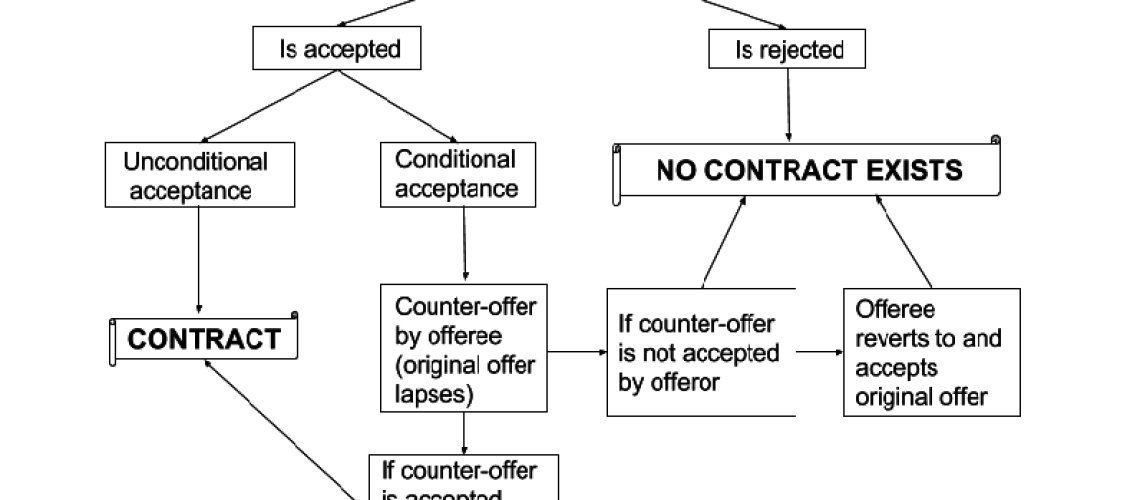By Siddharth Dey
When an offer by the offeror is accepted by the offeree, it is called acceptance. An offer, when accepted forms an agreement.
Offer + Acceptance → Agreement
Unlike in the case of offer, an acceptance has to meet with certain conditions in order to be valid as one.
Below, we’ll go through those conditions.
Elements of a Valid Acceptance
1) Acceptance must be communicated by the offeror to the offeree
Acceptance in essence means making one’s assent known to the offeror. This means that if Arvind makes an offer to Varun, and Varun wants to accept it, he must ensure that Arvind is made aware of his assent, by one way or another.
What if a Varun assigns Rahul, a third party (another person outside the two parties of the contract), to communicate his acceptance to Arvind. What if that third party fails to do so?
Legally we’ll say, Varun’s communication has the effect of being made to a third party and not to the offeror. Therefore, it fails the first rule.
As such, the acceptance has not reached Arvind, so he will not be liable to fulfil his offer to Varun. Between Varun and the third party, it’s a different matter.
There, the third party’s liability will depend on the intention with which they had entered into the contract. Try to recall the portion about the legal intention behind an offer from the previous article.
Such an acceptance will not form an agreement.
Therefore,
Offeror makes offer → Offeree gives acceptance → Offeror receives the acceptance = Binding Agreement.
We will discuss the different modes of communication and their rules in detail in the following article.
Lesson – acceptance must reach the offeror and he must also be aware it.
2) Acceptance must be absolute and unqualified
The Law of Contracts follows a ‘no strings attached’-policy vis-à-vis acceptance. An acceptance cannot have any conditions attached to it.
This is because an acceptance is one’s assent to an offer as it is.
This ‘conditional acceptance’ occurs commonly in bargaining. If X offers to pay Rs. 100 to Y for a product (legally termed as ‘goods’), Y can either:
i) Accept it the Rs. 100 for the goods; or,
ii) Name a different price, let’s say, by saying, “I agree to sell it to you but only at Rs. 120.”
Now, case (i) forms an agreement straightaway. In case (ii), the italicized part of Y’s ‘acceptance’ is his condition. Words and phrases such as “but”, “if”, “in case” are key to spot an acceptance with a condition attached.
If you rearrange it slightly to make the meaning of Y’s statement clearer: “I will sell it to you only at Rs. 120”. That’s because he is not agreeing to sell it as per X’s offer; but he agrees to sell it only at his own price.
In such a case, Y is making a counter-offer which X is free to accept or reject (or even yet make his own counter-offer!). This counter-offer functions just like any other offer, and not as an acceptance of X’s original offer. This will not bind X.
Lesson – acceptance should not be ‘conditional’; conditional acceptance is not binding on the offeror.
3) Acceptance must be communicated in the prescribed manner or in a reasonable/usual manner.
An offer may specifically mention that the acceptance be sent only by a telegram and no other means. If any other means is used, even though the acceptance will be communicated, it will not be a ‘valid’ acceptance for failing this third rule.
On the other hand, if an offer contains no such stipulation, then any usual mode of communication such as telephone, e-mail, telegram, fax, etc. may be used.
So, if a company makes an advertisement for sale of its products, a buyer should contact the agent by phone or e-mail, instead of floating a large banner in front of the office expressing his intention to buy the products.
Lesson – only in the absence of a prescribed mode of acceptance, the usual modes of acceptance can be used.
4) Acceptance has to be communicated while the offer is subsisting.
If a date is mentioned as the deadline for communicating acceptance, that also makes up the ‘terms and conditions’ of the offer. Failing that deadline not only bypasses a condition of the offer, but also, the offer lapses or expires, i.e., no longer exists.
An offer may be revoked (which will be covered in the next article) before an acceptance is communicated. This has the same effect, and the offer ceases to subsist.
Also, once an offer has been rejected or a counter offer is made to the original offer, the original offer lapses. If the offeree decides to accept the original offer after that, the acceptance will be hit by this rule.
This diagram is a summary of the above:



1 thought on “<b> CLAT Legal Reasoning:</b> Law of Contracts – Acceptance”
amazing>>>>>>>